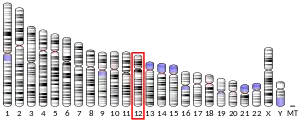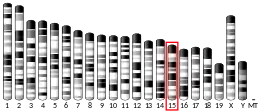Keratin 4
Keratin, type I cytoskeletal 4 also known as cytokeratin-4 (CK-4) or keratin-4 (K4) is a protein that in humans is encoded by the KRT4 gene.[5][6]
| KRT4 | |||||||||||||||||||||||||
|---|---|---|---|---|---|---|---|---|---|---|---|---|---|---|---|---|---|---|---|---|---|---|---|---|---|
| Identifiers | |||||||||||||||||||||||||
| Aliases | KRT4, CK-4, CK4, CYK4, K4, WSN1, Keratin 4 | ||||||||||||||||||||||||
| External IDs | OMIM: 123940 MGI: 96701 HomoloGene: 20523 GeneCards: KRT4 | ||||||||||||||||||||||||
| |||||||||||||||||||||||||
| |||||||||||||||||||||||||
| |||||||||||||||||||||||||
| Orthologs | |||||||||||||||||||||||||
| Species | Human | Mouse | |||||||||||||||||||||||
| Entrez | |||||||||||||||||||||||||
| Ensembl | |||||||||||||||||||||||||
| UniProt | |||||||||||||||||||||||||
| RefSeq (mRNA) | |||||||||||||||||||||||||
| RefSeq (protein) | |||||||||||||||||||||||||
| Location (UCSC) | Chr 12: 52.81 – 52.81 Mb | Chr 15: 101.92 – 101.92 Mb | |||||||||||||||||||||||
| PubMed search | [3] | [4] | |||||||||||||||||||||||
| Wikidata | |||||||||||||||||||||||||
| |||||||||||||||||||||||||
Keratin 4 is a type II cytokeratin. It is specifically found in differentiated layers of the mucosal and esophageal epithelia together with keratin 13. Mutations in the genes encoding this protein have been associated with White Sponge Nevus, characterized by oral, esophageal, and anal leukoplakia.[7]
References
- GRCh38: Ensembl release 89: ENSG00000170477 - Ensembl, May 2017
- GRCm38: Ensembl release 89: ENSMUSG00000059668 - Ensembl, May 2017
- "Human PubMed Reference:". National Center for Biotechnology Information, U.S. National Library of Medicine.
- "Mouse PubMed Reference:". National Center for Biotechnology Information, U.S. National Library of Medicine.
- Barletta C, Batticane N, Ragusa RM, Leube R, Peschle C, Romano V (1990). "Subchromosomal localization of two human cytokeratin genes (KRT4 and KRT15) by in situ hybridization". Cytogenet. Cell Genet. 54 (3–4): 148–50. doi:10.1159/000132979. PMID 1702379.
- Schweizer J, Bowden PE, Coulombe PA, Langbein L, Lane EB, Magin TM, Maltais L, Omary MB, Parry DA, Rogers MA, Wright MW (July 2006). "New consensus nomenclature for mammalian keratins". J. Cell Biol. 174 (2): 169–74. doi:10.1083/jcb.200603161. PMC 2064177. PMID 16831889.
- Chao SC, Tsai YM, Yang MH, Lee JY (June 2003). "A novel mutation in the keratin 4 gene causing white sponge naevus". Br. J. Dermatol. 148 (6): 1125–8. doi:10.1046/j.1365-2133.2003.05337.x. PMID 12828738. S2CID 26905614.
Further reading
- Leube RE, Bader BL, Bosch FX, et al. (1988). "Molecular characterization and expression of the stratification-related cytokeratins 4 and 15". J. Cell Biol. 106 (4): 1249–61. doi:10.1083/jcb.106.4.1249. PMC 2114990. PMID 2452170.
- Samen U, Eikmanns BJ, Reinscheid DJ, Borges F (2007). "The Surface Protein Srr-1 of Streptococcus agalactiae Binds Human Keratin 4 and Promotes Adherence to Epithelial HEp-2 Cells". Infect. Immun. 75 (11): 5405–14. doi:10.1128/IAI.00717-07. PMC 2168289. PMID 17709412.
- Barcelos AC, Sotto MN (2009). "Comparative analysis of the expression of cytokeratins (1, 10, 14, 16, 4), involucrin, filaggrin and e-cadherin in plane warts and epidermodysplasia verruciformis plane wart-type lesions". J. Cutan. Pathol. 36 (6): 647–54. doi:10.1111/j.1600-0560.2008.01127.x. PMID 19515043. S2CID 205816580.
- Terrinoni A, Candi E, Oddi S, et al. (2000). "A glutamine insertion in the 1A alpha helical domain of the keratin 4 gene in a familial case of white sponge nevus". J. Invest. Dermatol. 114 (2): 388–91. doi:10.1046/j.1523-1747.2000.00890.x. PMID 10652003.
- Zhang JM, Yang ZW, Chen RY, et al. (2009). "Two new mutations in the keratin 4 gene causing oral white sponge nevus in Chinese family". Oral Dis. 15 (1): 100–5. doi:10.1111/j.1601-0825.2008.01498.x. PMID 18992023.
- Opitz OG, Jenkins TD, Rustgi AK (1998). "Transcriptional regulation of the differentiation-linked human K4 promoter is dependent upon esophageal-specific nuclear factors". J. Biol. Chem. 273 (37): 23912–21. doi:10.1074/jbc.273.37.23912. PMID 9727005.
- Gerhard DS, Wagner L, Feingold EA, et al. (2004). "The Status, Quality, and Expansion of the NIH Full-Length cDNA Project: The Mammalian Gene Collection (MGC)". Genome Res. 14 (10B): 2121–7. doi:10.1101/gr.2596504. PMC 528928. PMID 15489334.
- Wolfe BA, Takaki T, Petronczki M, Glotzer M (2009). Pellman D (ed.). "Polo-Like Kinase 1 Directs Assembly of the HsCyk-4 RhoGAP/Ect2 RhoGEF Complex to Initiate Cleavage Furrow Formation". PLOS Biol. 7 (5): e1000110. doi:10.1371/journal.pbio.1000110. PMC 2680334. PMID 19468300.
- Ota T, Suzuki Y, Nishikawa T, et al. (2004). "Complete sequencing and characterization of 21,243 full-length human cDNAs". Nat. Genet. 36 (1): 40–5. doi:10.1038/ng1285. PMID 14702039.
- Strausberg RL, Feingold EA, Grouse LH, et al. (2002). "Generation and initial analysis of more than 15,000 full-length human and mouse cDNA sequences". Proc. Natl. Acad. Sci. U.S.A. 99 (26): 16899–903. doi:10.1073/pnas.242603899. PMC 139241. PMID 12477932.
- Presland RB, Dale BA (2000). "Epithelial structural proteins of the skin and oral cavity: function in health and disease". Crit. Rev. Oral Biol. Med. 11 (4): 383–408. doi:10.1177/10454411000110040101. PMID 11132762.
- Mischke D, Wild G (1987). "Polymorphic keratins in human epidermis". J. Invest. Dermatol. 88 (2): 191–7. doi:10.1111/1523-1747.ep12525329. PMID 2433356.
- Wanner R, Förster HH, Tilmans I, Mischke D (1993). "Allelic variations of human keratins K4 and K5 provide polymorphic markers within the type II keratin gene cluster on chromosome 12". J. Invest. Dermatol. 100 (6): 735–41. doi:10.1111/1523-1747.ep12475671. PMID 7684424.
- Wanner R, Zhang J, Dorbic T, et al. (1997). "The promoter of the HaCaT keratinocyte differentiation-related gene keratin 4 contains a functional AP-2 binding site". Arch. Dermatol. Res. 289 (12): 705–8. doi:10.1007/s004030050265. PMID 9452892. S2CID 7854003.
- Sowa ME, Bennett EJ, Gygi SP, Harper JW (2009). "Defining the Human Deubiquitinating Enzyme Interaction Landscape". Cell. 138 (2): 389–403. doi:10.1016/j.cell.2009.04.042. PMC 2716422. PMID 19615732.
- Burkard ME, Maciejowski J, Rodriguez-Bravo V, et al. (2009). Pellman D (ed.). "Plk1 Self-Organization and Priming Phosphorylation of HsCYK-4 at the Spindle Midzone Regulate the Onset of Division in Human Cells". PLOS Biol. 7 (5): e1000111. doi:10.1371/journal.pbio.1000111. PMC 2680336. PMID 19468302.
- Romano V, Bosco P, Rocchi M, et al. (1988). "Chromosomal assignments of human type I and type II cytokeratin genes to different chromosomes". Cytogenet. Cell Genet. 48 (3): 148–51. doi:10.1159/000132612. PMID 2466616.
This article is issued from Wikipedia. The text is licensed under Creative Commons - Attribution - Sharealike. Additional terms may apply for the media files.




